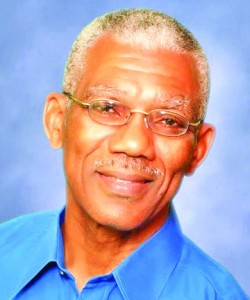
The opposition coalition A Partnership for National Unity (APNU) is calling for better working conditions for members of the Guyana Police Force, saying this will inspire ranks to better perform their duties with diligence and integrity.
At the party’s weekly press conference, its chairman, David Granger highlighted rising road fatality figures, pointing out the recent death of Chief Librarian Gillian Thompson.
He said the force is “badly under strength, with some 200 officers leaving every year. “We are calling for increased enforcement so that we can save more lives. We do think that the Police Force can be brought up to the standard that is required but it calls for government policy, and to direct resources where they are needed. Too many people are dying”.
The opposition leader recalled that a few years ago, it was recommended that police officers be given a higher level of remuneration in order to attract better recruits and retain those in service. “I think the absence of implementation of those recommendations is why over 200 persons leave the force today,” Granger stated.
Corruption within the force is another factor that needs to be addressed urgently by the police authority, he added, noting that with a better paid and full-strength police force, there will be no such woes to worry about.
Granger stressed that as long as the police force is under-strength, those who remain in the service will have to do double the work and this may result in corruption.
Increase in remuneration
APNU’s shadow home affairs minister and former police commissioner, Winston Felix, shared the same views on the increase in remuneration, stressing that the force needs to offer an attractive package so that persons would want to be employed there. “It’s not just about pay but conditions of services,” he stated.
Felix pointed out that corruption is more prevalent when officers are on the road without any guidance or supervision by their seniors. He recalled a programme which was created years ago whereby senior officers would just show up on the road to assess the work of ranks, pushing policemen and women to behave professionally.
“Ranks on the road would not know when they would be tested and this is one of the ways to ensure that they keep their behaviour in check.”
Felix pointed out that society too has a hand in the prevalence of bribery and corruption, noting that it is a “two-way street”. “If there is not a giver, there will not be a receiver so we have to look at the nature of how society works. Why some people prefer to pay a bribe and do the wrong thing? We pay a bribe so that somebody could turn a blind eye to what you are doing rather than keeping the money and doing what is right of you. These are social issues which the force has to deal with,” Felix said.



